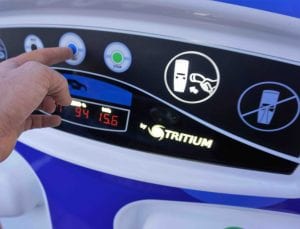A new report has highlighted how sensible EV policies will support an excess load on the power system as Australia transitions to battery-electric cars, as well as providing savings to the customer.
The report, from the University of Melbourne and the energy industry peak body Energy Networks Australia, warns that without implementing its suggested policies, the increased load on the electricity grid could undermine energy security and increase energy costs.
Smart EV charging is trending upwards in the US and UK, and the report suggests smart charging systems will make their way to Australia within the next few years.
Smart chargers allow electricity use to be managed sustainably by, for example, rewarding customers with low prices for charging their vehicles when electricity is plentiful.
EV smart chargers can adjust charging levels in accordance with communication signals – whether from the customer or the retailer. They can be set by a customer to automatically start charging at specific times, or they can be controlled externally by the retailer to ensure a lower cost.
All chargers should be smart
The recommendations reflect this trend, and suggest that all EV chargers should be smart chargers, that tariffs should be reformed to reward flexibility of charging, and that smart meters should be encouraged in tandem with smart chargers.
The report also recommends that Australia should follow International standards in EV charging to reduce costs and increase the availability of options.
According to the Energy Security Board (ESB), distributed electricity resource (DER) systems and flexible demand could reduce system costs for Australia’s National Electricity Market (NEM) by more than $6 billion.
Some states have gone so far as to enshrine their use in law: EV chargers with smart functionality will be required from 2024 in South Australia.
ENA CEO Andrew Dillon says mass adoption of EVs, while desirable, will constitute a major load on the energy grid.
“If the right policy settings are in place, EVs can help reduce power costs, lower emissions and support the electricity grid by soaking up excess solar production,” he says.
“We need smart charging for electric vehicles that aligns with off-peak times, coupled with flexible electricity pricing options for customers to make power supply cheaper when there is plenty of it available.
“This will ensure we can avoid spending more than we need upgrading electricity infrastructure, reducing waste of excess renewable generation and deliver major savings for customers on their power bills.”
Important tips for policy makers
Dillon says the EV integration report makes sensible recommendations that the ENA will feed into the federal government’s National Electric Vehicle Strategy consultation.
The report suggests that if mandatory EV smart chargers aren’t accepted, the government should work with stakeholders to make the financial benefits of smart chargers more attractive to retailers, or subsidise the additional cost of a smart charger.
Smart charging is a nascent technology in Australia, though it has been taken up in a number of early stage trials.
Energy retailer AGL has offered smart charging to a limited run of 300 customers since 2020, as part of a running trial in collaboration with the Australian Renewable Energy Agency (ARENA).
Origin is running a similar trial deploying 150 smart EV chargers at residential, commercial and industrial properties across NSW, Victoria, Queensland and South Australia.










